Last updated on May 22nd, 2024 at 14:07
Coffee filters sizes, shapes and types can be confusing to both new and long term coffee enthusiasts and coffee lovers alike.
Where do you start?
Which one do you use?
A permanent filter? A bleached filter or unbleached filters, cone coffee filter?
Do you go for a disposable coffee filter or just chill with a basket filter?
Such choices and such complications just for selecting the coffee filter size and shape. This is exactly why I created this guide about coffee filter sizes, shapes and types.
By the time you have finished reading this article, you will have a much better knowledge of coffee filters, which one to use and when.
Grab a chair and keep reading as we dig down and detail this topic.
What Is A Coffee Filter?
Table Of Contents
- 1 What Is A Coffee Filter?
- 2 How Does A Coffee Filter Work?
- 3 Coffee Filter Sizes
- 4 Coffee Filter Shapes And Types Of Coffee Filters
- 5 Types of Coffee Filters – The Materials
- 6 Paper Filters
- 7 FAQs Frequently Asked Questions About Coffee Filter Sizes
- 7.1 Do Coffee Filters Go Bad
- 7.2 Do Coffee Filters Affect Taste?
- 7.3 What Can I Use As A Substitute When I Have No Coffee Filter?
- 7.4 Can You Compost A Used Coffee Filter?
- 7.5 Can Coffee Filters Filter Water?
- 7.6 What Are The Sizes Of Coffee Filters?
- 7.7 What Size Filtering Is A Coffee Filter?
- 7.8 What Is The Difference Between Size 2 And Size 4 Coffee Filters?
- 8 Frappé-Ing It All Up – Coffee Filters Sizes
A coffee filter is a filter that is used during the coffee brewing process, with a paper coffee filter being the most common type used. These paper filters are usually manufactured with disposable paper.
Other materials used include cotton and metal.
Regardless of which materials are used, coffee filters trap coffee grounds and prevent them from getting into the coffee below while still allowing the liquid coffee and water mix to flow.
Paper filters trap and prevent all the coffee oils from making their way into your coffee, which results in a clean, crisp taste. The diterpenes, which are an organic compound with anti-inflammatory properties.
Cotton filters filter out some coffee oils and leave some in the resulting brew, which has the result of a slightly stronger coffee.
A metal filter, my preferred choice, permits all the coffee oils to get into your coffee, resulting in a stronger, fuller coffee.
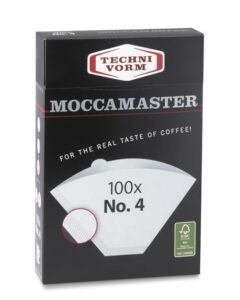
Read: How does a percolator work?
How Does A Coffee Filter Work?
The function and purpose of coffee filters are easy to understand. It is to permit hot water to flow with the dissolved flavor compounds of your coffee beans with the taste, aroma and color to remain in the coffee-water solution and prevent the grains of coffee and fine coffee particles from making their way into your brewed coffee.
It is essentially a membrane that allows the coffee-water solution to pass through yet holds and prevents the coffee particles from passing through and getting into your coffee.
A fine example is a Chemex or drip coffee filter that holds in the coffee grounds as the coffee liquid passes and drips into the carafe below.
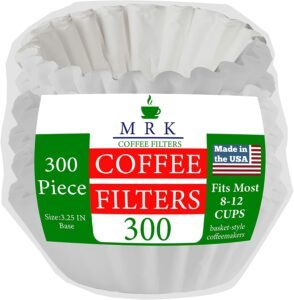
Read: How to make coffee in an electric percolator
Coffee Filter Sizes
Let’s now talk about the most common and most popular coffee filter sizes. Cone coffee filters are sized by numbers, which is wholly dependent on the amount of coffee that is going to be brewed.
Most modern automatic coffee makers are capable of brewing from four to six cups of coffee, which would require the use of a No 2 filter size. When eight to twelve cups are to be brewed, a number 4 coffee filter size should be used.
When you are brewing 10 cups of coffee, you should be looking at a number 10 filter size. A small single cup of coffee will require the use of a number 1 coffee filter size.
Basket coffee filters are of a standard size and dimension and thus have a standard size of filter. If you are brewing less than 6 cups of coffee at a time, you will need to use junior-sized basket coffee filters.
Note: The coffee cup size assumed here is a small 6 ounce (180 ml) cup size.
| Coffee Filter Size | What It Should Be Used With |
| No. 1 | Single serve coffee makers, for making 1 or 2 cups of coffee. |
| No. 2 | An Automatic Coffee Maker Of 4 To 6 Cups |
| No. 4 | An Automatic Coffee Maker Of 8-12 Cups |
| No. 6 | An Automatic Coffee Maker Of 10+ Cups Or Cone Style Drip Coffee Maker. |
| Basket (junior) | Standard Size for flat bottom filter baskets |
| Coffee Basket | 6 cups or less flat-bottomed coffee filter baskets |
Coffee Filter Shapes And Types Of Coffee Filters
There are 3 main coffee filter shapes which are:
- 1. Conical Filters.
- 2. Disc Filters.
- 3. Bucket Filters.
The shape is usually determined by the coffee brewer. The most common types of coffee filters are conical filters and cone filters. Both are used by commercial coffee brewers and for home use.
Let’s talk about each of these common coffee filter types.
Conical Coffee Filters
Conical coffee filters are, as the name indicates, cone-shaped filters with a fine point at the bottom and a wide opening. You will be very familiar with this type of coffee filter being used in pour over coffee and drip coffee makers. They are organized into the four standard sizes on the table above and vary depending on the capacity of coffee that the coffee maker can produce.
Disc Coffee Filters
This type of coffee filter is less common and is the type of filter that you will see in an Aeropress. You may also see them in percolators, which are more of a donut shape. A French press can also use this type of filter.
These types of coffee filters are more commonly used with medium-ground to medium-coarse ground coffee.

Bucket Filters (Basket Filters)
Basket coffee filters and bucket coffee filters are one and the same thing. Different people will use different names. Another common name is flat-bottomed coffee filtered, which is very descriptive of its shape.
The difference between these bucket filters and cone-shaped filters is they have a wide opening and a wide flat bottom where the conical filters come to a fine point at the bottom.
The difference in shape does have an impact on the flavor of your coffee. The conical filter with the fine point and wide opening ensures an even extraction of the flavor compounds.
Flat-bottomed coffee filters can lead to under extraction and an uneven distribution of flavor compounds when extracting. With a quality coffee machine, this is not an issue. With manual pour over coffee, you can easily ensure a good even extraction with good, well-practiced technique, and it will not affect your morning coffee at all. Be careful not to flood this type of filter with hot water.
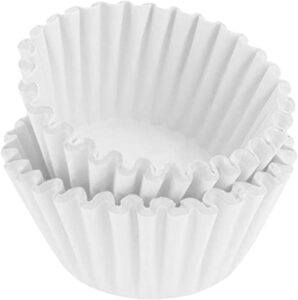
AeroPress Filters
An Aeropress coffee filter is disc shaped and more of a specialty filter as generally speaking it is best that you use the brand’s own custom-designed paper coffee filters.
Recently and due to demand and our (as well as others) petition, they have come up with a metal filter.
You cannot use an Aeropress coffee filter in any other coffee brewer. They are fully disposible coffee filters and environmentally aware coffee enthusiasts can compost this type of coffee filter.
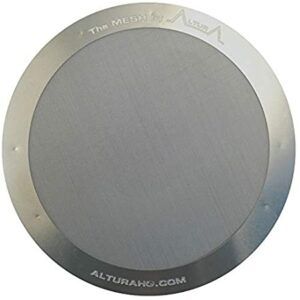
Chemex Coffee Filters
Filters for a Chemex coffee maker are heavier than other brands, which permit them to remove the finest of coffee particles.
They produce a good, clean, crisp coffee taste. These are of the cone-shaped type.
Hario V60 Coffee Filters
This coffee maker uses a very common and standard cone shape coffee filter with a large hole in the bottom of the coffee dripper. Hario V60 coffee filters are made with natural organic paper pulp with zero chemicals used during the manufacturing process. You can expect to enjoy delicious coffee with this type of drip coffee maker.
The quality of coffee is, I have to admit, very good. Expect a fresh coffee full of flavor. This is something I say despite not being a fan of drip coffee – I am guilty of enjoying the slow meditative process of brewing drip coffee.
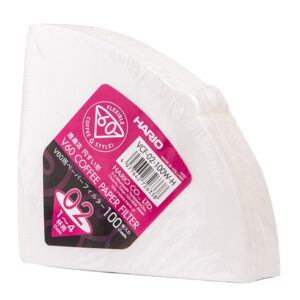
Types of Coffee Filters – The Materials
When it comes to the types of coffee filters and the materials they are made from, most people will only be able to identify two types of material, paper and cotton. There is a third material, metal, most commonly stainless steel.
These materials categorize coffee filters into two different categories:
- 1. Permanent Coffee Filters
- 2. Disposable Coffee Filters.
The material that the coffee filter is made from can determine if finer coffee particles can pass through or not and have an impact on the flavor of your coffee.
A metal filter, for example, will result in a full flavor coffee as all the coffee oils will be extracted into your morning cup of coffee during the brewing process.
Permanent Metal Coffee Filters
Permanent coffee filters are of course the stainless steel metal coffee filters that you can use for a lifetime – and will likely out last your time on earth!
Metal coffee filters give you a different coffee experience from paper coffee filters. For a start, the mesh pores are larger and thus does not block or filter out the natural coffee oils that flavor your coffee. Some particles will unfortunately, make their way into your coffee pot.
Even the very best metal coffee filter is prone to this minor fault – really it is not a fault as you are most likely to use a coarse coffee grind size with this type of filter.
If you need to use a finer grind size, you can always put a paper filter inside the metal filter if it is a concern but really, it is not necessary as the coffee filter pore size of metal filters is so small any particles that make their way into your coffee are minimal.
For me, I love this type of filter due to the richer taste.
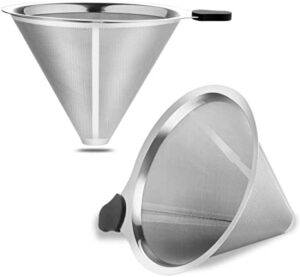
Cleaning A Metal Coffee Filter
This is probably the downside to a metal coffee filter – they are tricky to clean. A good daily cleaning and a weekly deep clean are essential. Some coffee experts suggest daily and monthly deep cleaning. I prefer a weekly deep clean as it makes it much easier long term.
The daily clean is as simple as throwing out the old grounds, better still is composting them. Give the filter a good clean with soap and hot water. There is no need for an abrasive substance to be used at all. Any coffee particles that are stuck you can poke free with a needle. After that I like to let it sit in boiling hot water with soap to get rid of coffee grime and oils that maybe left and then air dry.
The daily clean-up helps you to make good, fresh tasting coffee every day you are brewing it.
A weekly deep clean, following the same process as above, but soak your filter in baking soda for about 4 hours. Give it a good proper rinse afterward with an abundance of water.
Do this, and you will keep your coffee fresh tasting.
There is no need for a specialist coffee filter cleaner.
Reusable Cloth Filters
Cloth coffee filters are a popular filter choice as like reusable metal filters they permit the coffee oils to make their way into your coffee, resulting in a rich flavor and an amazing coffee that is a balance between a paper filter and a metal filter.
Cloth filters, in my humble opinion, fit into a third category – semi-permanent filters as they are neither permanent like metal filters and still reusable but do have a shelf life in terms of how many times you can use it, usually 20 to 30 uses easily.
You can wash and reuse them, but with many uses they become old and are best disposed of. Surprisingly, they are the least common coffee filter material by sales and use. If you have not tried drip coffee or pour over coffee with a cotton filter, I absolutely suggest that you do as brewing coffee with this type of filter will get you great results, somewhat halfway between metal filters and paper filters.
Cotton comes with three choices: bleached coffee filters, unbleached and organic. I don’t like the chlorine bleaching process for either paper or cotton filters. I suggest scoring that off the list and looking for unbleached or organic cotton.
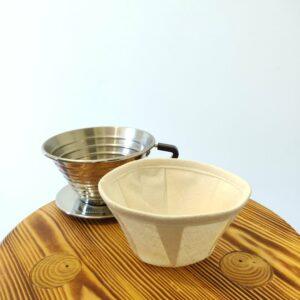
Paper Filters
Last, and most certainly not least, are paper coffee filters. This is, of course, by sales and usage, the most popular and commonly used type of coffee filters. They are cheap, easy to use, and biodegradable.
Bleached Paper Filters
Bleached paper filters are bleached with two types of bleached filters: chlorine bleached and oxygen bleached. The most common type now is oxygen, which is a far better substance to bleach filter with as they permit your paper filter to prevent finer particles from getting into your coffee and results in a clean, crisp tasting cup of coffee.
A bleached paper coffee filter is identifiable by its white color.
UnBleached Paper Filters
As the name suggests, unbleached coffee filters are exactly that. Usually they are off-white in color and result in a slightly papery taste to your coffee. It is a good idea to pour hot water over this type of filter before brewing your drip or pour over coffee.
FAQs Frequently Asked Questions About Coffee Filter Sizes
Do Coffee Filters Go Bad
No,
coffee filters of any type of material do not come with an expiry date. If you have them sitting in your cupboard for years, they are fine to use. There is no reason to throw out old unused coffee filters.
Do Coffee Filters Affect Taste?
Yes,
research indicates that different coffee filters affect the taste of your coffee. What ever changes is a variable and changing the variables be it the coffee filter material, type, shape or even the brewing temperature can influence the taste.
We have already touched on the subject of how cone-shaped filters can result in a more even tasting coffee than a flat-bottomed bucket filter. Also, as we have spoken about the material, metal, paper, cotton influence the taste due to more or less oil dripping into your coffee.
What Can I Use As A Substitute When I Have No Coffee Filter?
The common temporary substitutes for coffee filters are paper towels and napkins. A fine mesh sieve and a good clean dish towel are good backups also.
Can You Compost A Used Coffee Filter?
Yes,
coffee is great for compost as it contains many minerals that are great for the quality of the compost and modern coffee filters are biodegradable. Yes, you can definitely compost your coffee filter and coffee grounds.
Can Coffee Filters Filter Water?
Yes,
you can use your coffee filters to filter dirty water. But very dirty water will become clogged. To be clear it is not going to remove bacteria or pathogens, or viruses. You will need to boil the water first.
What Are The Sizes Of Coffee Filters?
There are 4 coffee filter sizes, which are as follows:
- #1 Coffee Filter: This is the size that you would use for a pour over or single cup coffee maker.
- #2 Coffee Filter: This is the size to use if you have a 2 to 6 cup coffee maker or a 1 or 2 cup pour over.
- #4 Coffee Filter: This is the size to use if you have a larger 8 to 10 cup coffee maker.
- #6 Coffee Filter: This is the size to use if you have a larger 10 cup+ coffee maker.
What Size Filtering Is A Coffee Filter?
A typical coffee filter has a pore size of 20 micrometers which is large enough to allow water to flow through and prevent the coffee particles and coffee grounds from getting into your brew.
What Is The Difference Between Size 2 And Size 4 Coffee Filters?
Both these filters look almost identical with the only difference being their size and what coffee makers they are for. A number 2 or a size 2 coffee filter is for a coffee maker that has the capacity of making 2 to 6 cups of coffee while a size 4 coffee filter is for a machine that has the ability to make 8 to 10 coffee maker.
Frappé-Ing It All Up – Coffee Filters Sizes
I hope you have enjoyed this article about coffee filter sizes and taken note of the coffee filter size chart – feel free to print it out and stick it on the side of your coffee machine for reference. Use the filter type and style that makes the coffee that you enjoy the most.
For me, it is metal filters due to the fuller flavor.
Join our cool coffee community and tell us about your own coffee filter preferences and experiences in using them to make better coffee. Find us on Facebook/Meta.

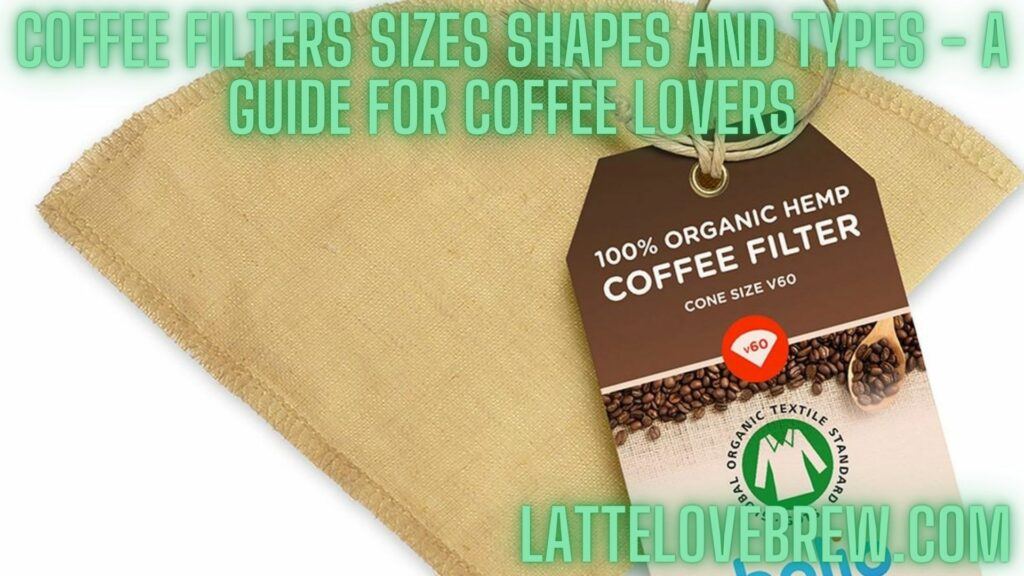



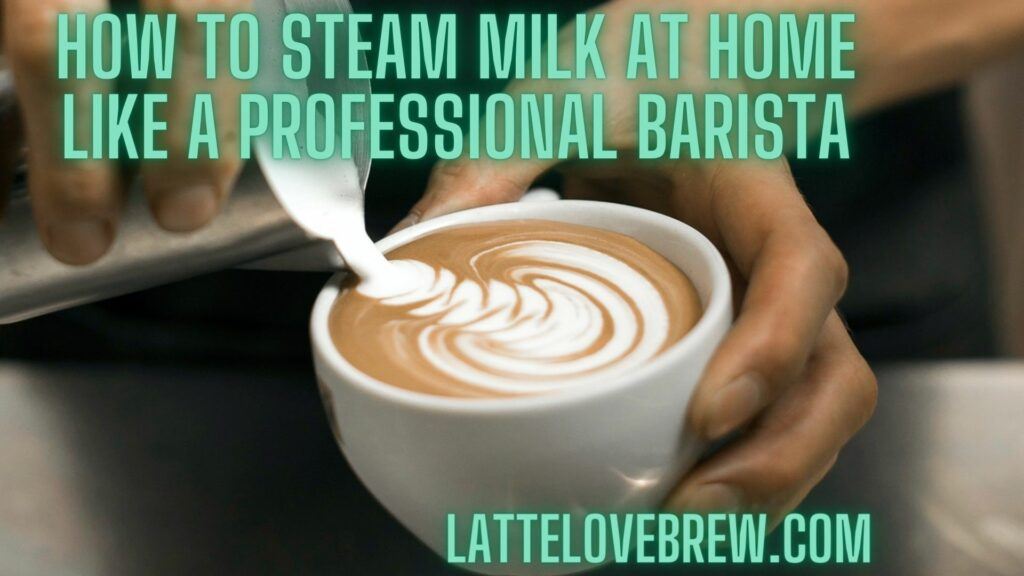
![[Recipe] How To Make Dunkin Iced Coffee At Home Like A Pro!](https://lattelovebrew.com/wp-content/uploads/2022/04/Recipe-How-To-Make-Dunkin-Iced-Coffee-At-Home-Like-A-Pro-1024x576.jpg)
